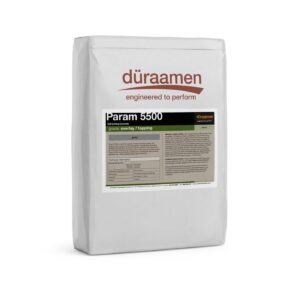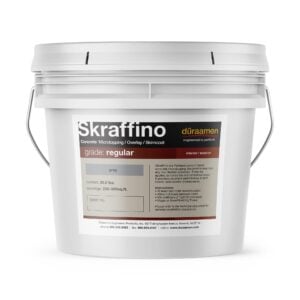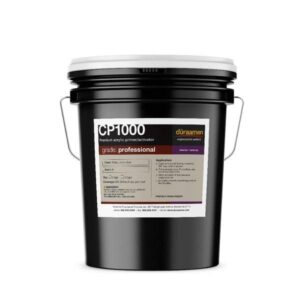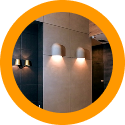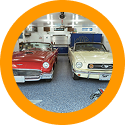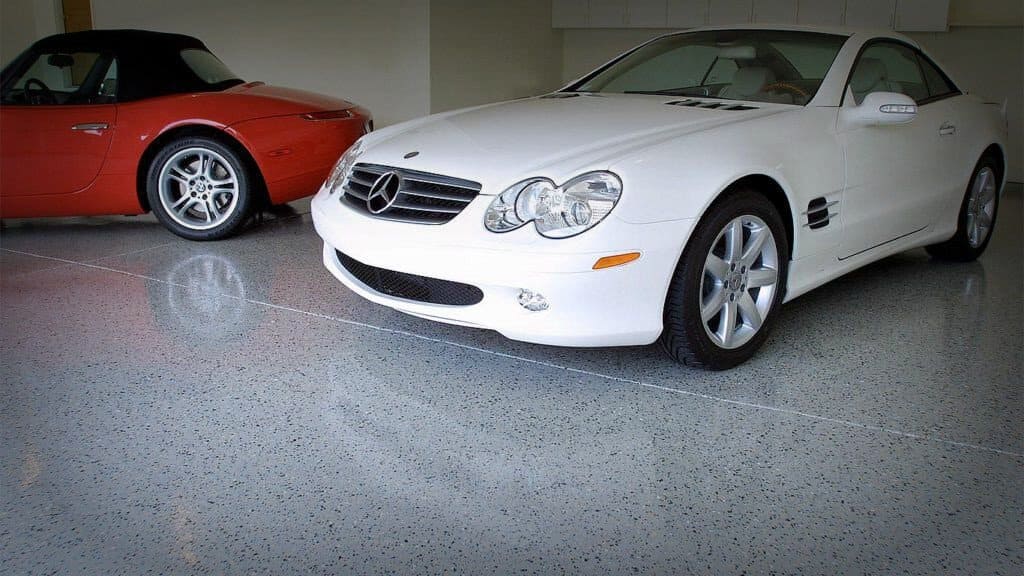
If you want to improve your garage floor’s performance, durability, and chemical resistance, epoxy coatings should be at the top of your list of products to use. With the right epoxy coating system, you can strengthen your garage floor, add chemical resistance, and keep your floor attractive after years of heavy wear.
Unfortunately, when it comes time to pick out the right epoxy coating for your garage floor, the choices may be overwhelming. In this article, we’ll explain how epoxy coatings work, and how to pick out the best coating for your garage floor.
What Is an Epoxy Floor Coating?
Simply put, an epoxy coating is an epoxy resin combined with a polyamine hardener. The two have to be mixed together prior to being applied. Once they’re mixed, you have only a certain amount of time to apply the coating.
Although you’ll pour or roll an epoxy coating on your substrate, it’s a mistake to confuse it with paint. When they harden, epoxy coatings chemically bond with the floor and form a thick, protective layer. In addition to melding with the base layer, the coating creates a durable surface that shrugs off scratches, oils, traffic wear, and hot-tire pickup. Alternatively, paint provides only a minor layer of surface protection.
Epoxy Coatings vs. Epoxy Paints for Garage Floors
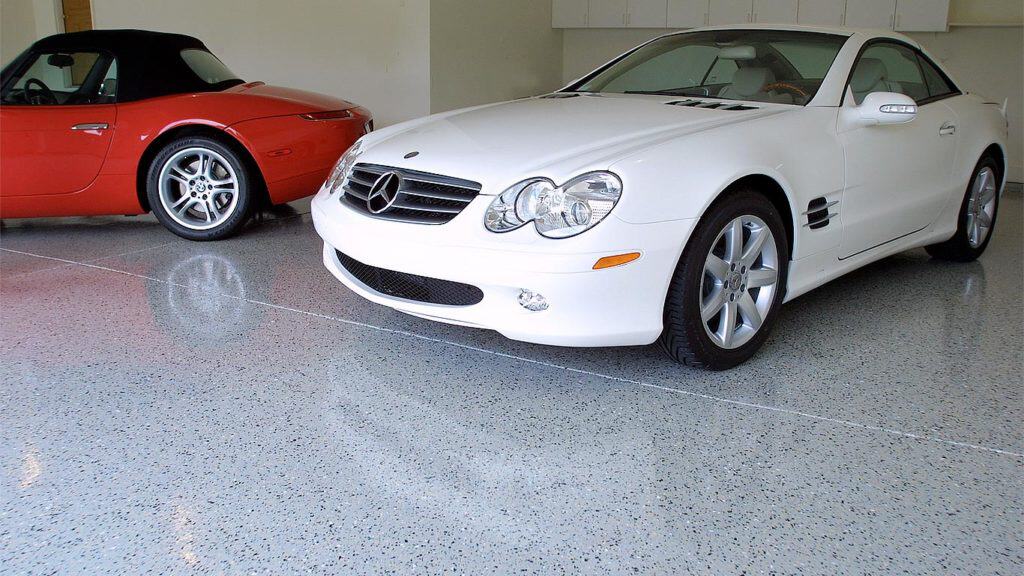 Unfortunately, avoiding epoxy paints can require extra awareness on your part. In some cases, a product may be labeled as “epoxy coating” and actually be epoxy paint. However, epoxy paints hold neither the durability nor the look of an epoxy coating.
Unfortunately, avoiding epoxy paints can require extra awareness on your part. In some cases, a product may be labeled as “epoxy coating” and actually be epoxy paint. However, epoxy paints hold neither the durability nor the look of an epoxy coating.
Wondering how to tell the difference between epoxy paint and epoxy coatings?=
Typically, garage floor paint is an acrylic latex product. Some manufacturers do offer paint that is blended with epoxy resin, but it tends to be called “one-part epoxy paint.” Although these products allow for better adhesion and durability than simple paint, they still don’t feature the qualities of a true epoxy coating.
Remember, epoxy coatings use a two-part system that changes the physical properties of your flooring and strengthens your floor’s surface.
How Do True Epoxy Coatings Protect Garage Floors?
Epoxy coatings create a hard, strong, chemical-resistant, and durable surface. They can withstand heavy abrasion, grease, oil, and the impact of vehicles themselves. Still, not all epoxy floor coatings are created equally. Here are some qualities to look for in an epoxy floor coating:
1. High epoxy solids percentage
Your epoxy coating’s percentage of solids is what determines the durability and performance of the floor coating. Most epoxy paints that are available in your average building supply store have a low percentage of solids.
Ultimately, the higher the percentage of solids an epoxy coating has, the more epoxy the product will retain throughout the curing process. For instance, in a 100 percent solids epoxy, 100 percent of the epoxy product remains on the floor after it’s applied and dried.
Essentially, the higher the percentage of solids your epoxy coating has, the thicker your final layer will be, and the more protection your flooring will have.
2. High dry film thickness
Dry film thickness (DFT) is the final thickness of your protective coating. Basically, the greater the solids content, the greater the DFT. DFT is an area where most DIY epoxy paint kits from your typical home improvement store fall short.
To begin with, many epoxy paint kits don’t use an authentic epoxy resin. Too often, they use latex-based formulas that contain low amounts of solids. So even if it’s less expensive and easier to apply, your protective coat will be much thinner. That means it will be more susceptible to wear, and you’ll likely need to reapply it in a few years.
Wondering how professional epoxy coating kits compare?
Professional epoxy coating kits use true epoxy coatings. Because they’re often several times thicker than DIY store kits, they protect your flooring longer. They also tend to be more durable and last as much as four times as long as paints in many cases.
Even though it may have a higher up-front cost, because a quality epoxy coating doesn’t need to be replaced every few years, it tends to save buyers money in the long run.
3. Hot-tire pickup resistance
As you well know, tires can reach high temperatures. Unfortunately, if your garage floor features a cheap coating, hot tires can strip the flooring. However, quality epoxies will fully protect your flooring from this hot-tire pickup. They repel heat and chemicals, which keeps your floor’s coating intact and attractive.
What Types of Epoxy Floor Coatings Are Available?
Once you understand the basics of epoxy floor coatings, it’s time to pick the right type of coating for your project. Each coating type has distinct qualities, and your final choice will depend on how you want your garage floor to look, feel, and perform. Here’s a brief overview of epoxy coating types:
Metallic Epoxy Coatings
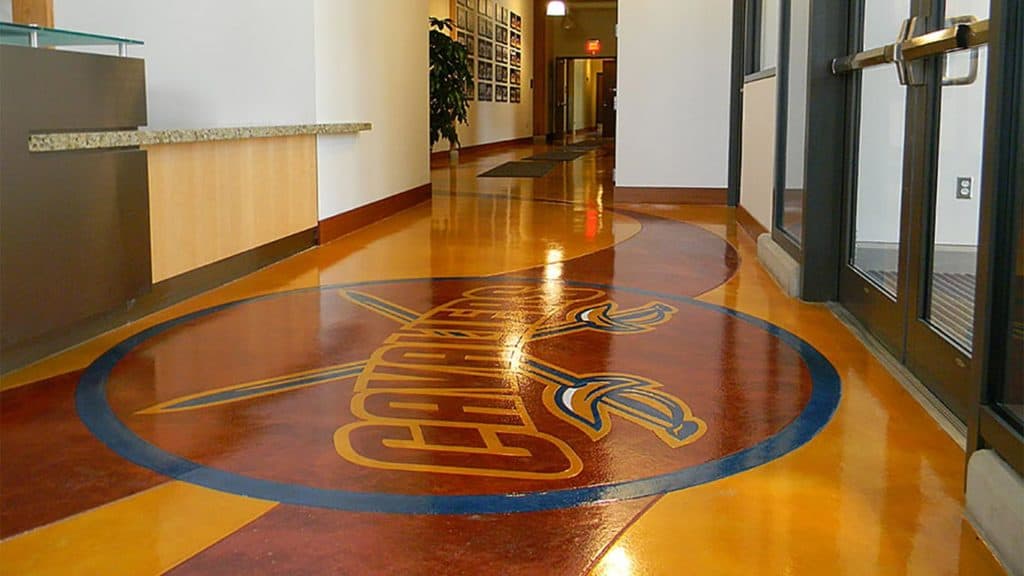
Metallic epoxy coatings combine the strength of industrial coatings with stunning visual effects. Because they include metallic particles, these coatings add a quality of depth and shine to a floor’s surface.
Because they can be used to lay out a variety of colors and styles, these coatings are popular in commercial spaces and high-end garages.
Novolac Coatings
If you’re worried about chemical or heat wear, novolac epoxy coatings are worth a second look. Novolac coatings harden into a durable thermoplastic material. When it’s combined with a high-quality curing agent, novolac epoxy resin gains two stellar qualities:
- Heat resistance: It maintains its properties in high temperatures and wet environments.
- Chemical resistance: It’s able to repel chemicals, acids, and harsh elements.
Novolac epoxy coatings are a popular choice in solvent storage facilities, plants, and flooring that needs to remain durable amid heavy traffic or chemical exposure.
Self-Leveling Epoxy Coatings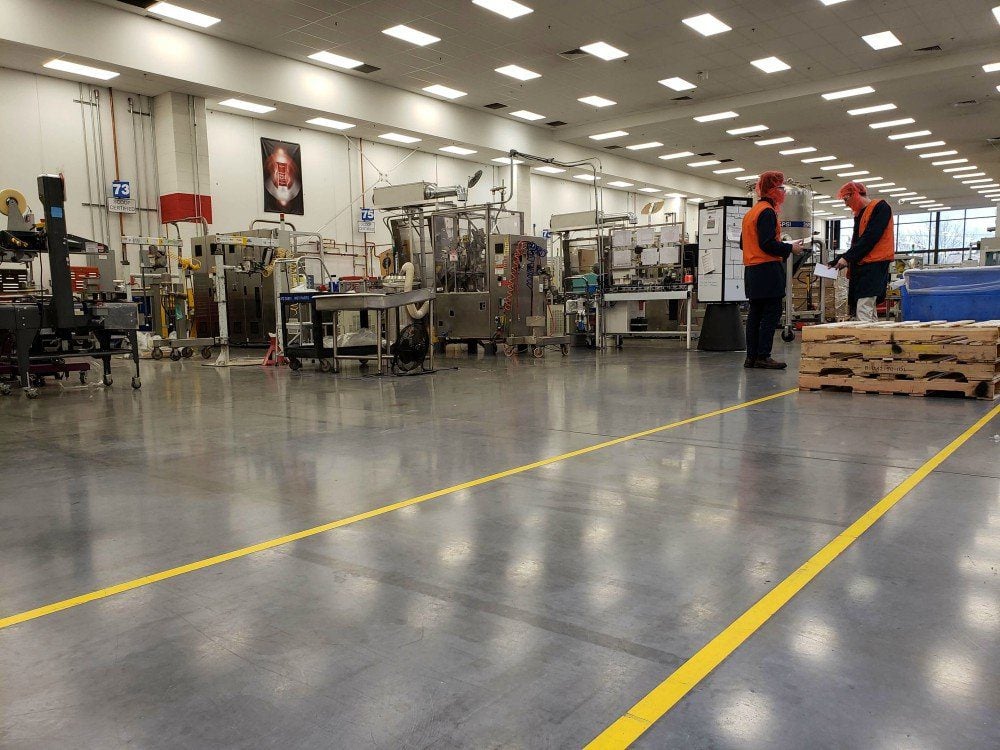
In many instances, users apply self-leveling epoxy to cracked, damaged, or worn concrete surfaces. It has the ability to revitalize the look of flooring while adding durability. Because it comes in a variety of color and gloss options, it’s a popular option in both commercial and residential spaces, including commercial garages, residential garages, and showrooms.
Quartz Epoxy Flooring
Often used in designer spaces and areas set aside to impress onlookers, quartz epoxy flooring includes quartz grains. In addition to having excellent anti-slip properties, it’s able to hold up to spills and heavy traffic. Quartz epoxy flooring is popular in lobbies, showrooms, and other areas that need to combine high aesthetic appeal with durability.
Learn How to Upgrade Your Garage Floor with Epoxy Coatings
Interested in adding epoxy coatings to your garage floor? We have the resources to help. Watch our garage floor installation video to learn how to add a professional-grade epoxy coating system to your garage floor.
DIY Kits – https://duraamen.com/shop/floor-packages/garage-floor-epoxy-coating-package/
